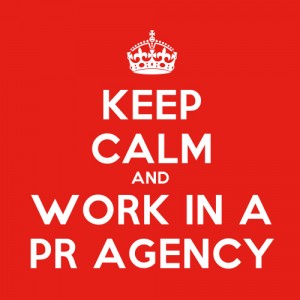Are you suited to a PR agency career?
About the author
Our guest authors are what make PR Place such a vibrant hub of information, exploration and learning.

This is an article by Dina Tomas
Those of us who aspire a career in public relations, no matter if we are graduates or we are in the first years of our university studying the art of communications, need to think about which environment suits us best.
Working in a PR agency is well-known for the intensity and fast-paced work environment, meaning that multi-tasking and time management have to be our middle names.
As any other industry and job, working in a PR agency has its glamorous side. But there are downsides too. Let’s see what industry experts say about it.
What is best about agency life?
Former CIPR president Chris Genasi says that the variety of projects one works on is the biggest difference between agency and in-house PR – everyday, there’s something new that you use your expertise for, constantly challenging your creativity. Alongside a passion for PR and achieving good results, this creates the real buzz of working in an agency.
Ben Novick, senior consultant in Good Relations Political Communications, adds:
“I was attracted to the agency world because I liked the idea of working for lots of different clients and, so far, I’ve found the consultancy experience exciting and vibrant. There is far more creativity and innovation, and not as many rules, regulations and hierarchies as there are in-house, particularly in the public sector.”
Everyone knows the jargon and has the expertise
Talking to PR Week, Liz Lewis-Jones, another former president of CIPR points out that one of the best things about working in an agency is that everyone has the required expertise. She says:
“It sounds obvious but after having to explain things to everyone outside the department when I was in-house, I was suddenly working with people who knew how it all worked and what the jargon was.”
What are the main downsides?
Compared to in-house, there is less security in agencies as they have to compete to win and retain clients. Also, it can be great to work on variety of projects and boost your creativity, but there is a flipside of it. It is easier to be an expert in one area and industry, compared to generating ideas for a number of different industries at the same time.
But there is a solution to this issue – some agencies offer expertise in particular industries, such as fashion, healthcare, sports or music. If you like to be challenged by various industries, then you can aim for a place in an agency that has a rich portfolio of accounts.
What skills do you need?
Copywriting
A good and well-written press release is a good and well-written press release, no matter if it originates from an agency or in-house. Copywriting skills are essential for working in communications, so the more you practice, the better.
Creativity and expertise
As mentioned earlier, you can expect working on multiple clients in all levels of industry competitiveness. Therefore, you should look beyond what everyone else sees, spotting opportunities and implementing them by thinking outside the box.
Great communicator
Similarly to copywriting, you have to be a great communicator – you are the person who talks to the clients and represents them in the outside world . Therefore, words should be your weapon, using it with precision in defending the not-so-good things and shout out the good ones.
Ability to work under pressure and meet short deadlines
Working in an agency can be very fun and creative, however, during a communications crisis you have to be able to remain calm, keep your objective and professional judgements and deliver appropriate solutions quickly.
The agency’s fast-paced environment means that you have to be really good at managing your time and prioritising work. Sometimes deadlines will give you plenty of time to work on a project. However, as things can change quickly and easily, you need to be able to meet short deadlines too.
Personality
Working with multiple clients with different characters suggests that you have to be very behaviourally flexible and adjust to the communications and working styles of your clients. Having and showing strong confidence, being patient and able to take on criticism, as well as friendly and easily approachable, will help you to work better with your clients and win their trust.
The business mind
Being an expert in communications is definitely the core of everything we are talking about, but having the business mind to understand all the pressures and changes in the environments that your clients face will benefit you greatly and help you deliver better solutions.
News hungry
In order to serve your accounts best, you need to know what’s going on in the world around you. Make sure your Twitter feed helps you stay on top of everything and you know the latest breaking news – this can help you not only to know how your accounts are affected, but also will give you opportunities to pitch the expertise of your clients to the media, giving them good media coverage.
The agency – in-house relationship
Despite the differences in the agency and in-house PR environments, Jennifer Leggio for Forbes suggests that agencies, in a way, are like children, as they cannot grow their business unless they are hired by an in-house team that needs the agency’s support and expertise. Jennifer says:
“A PR agency can only be as successful as the in-house team that manages it, and it is that team’s responsibility to treat that agency like a business partner, appropriately negotiate expectations and contracts, and escalate wins as well as challenges to the internal powers-that-be. For agencies working with smaller startups, quite often they are being managed by founders and CEOs who need to sometimes be told “no” or need a dose of reality from those interacting daily with the influencers in their market.”